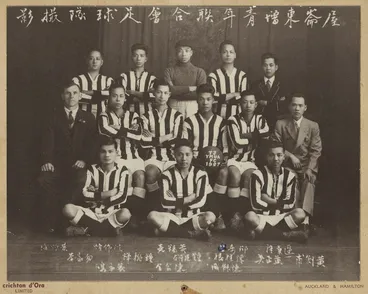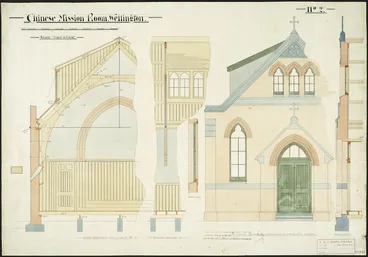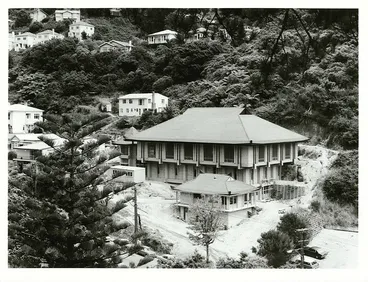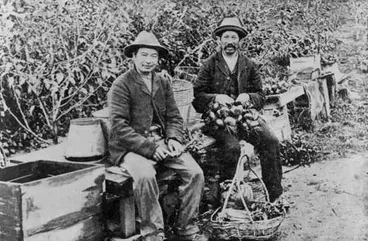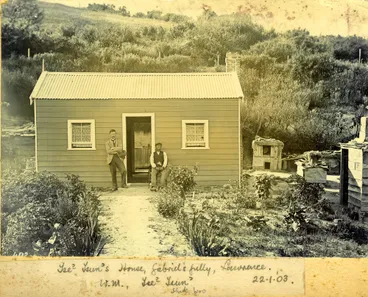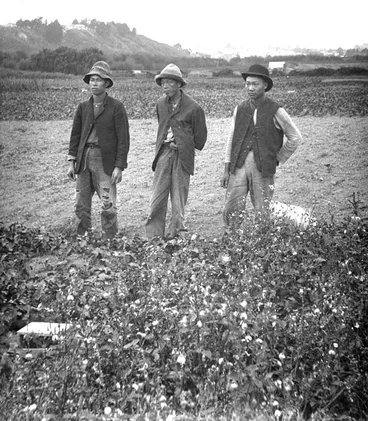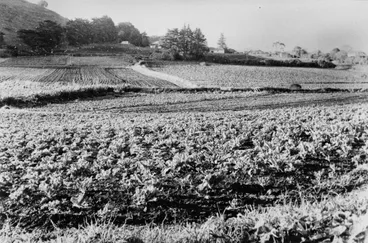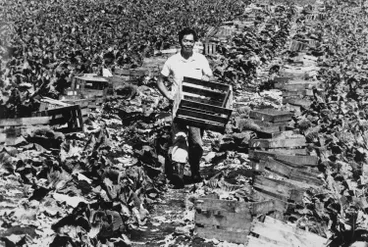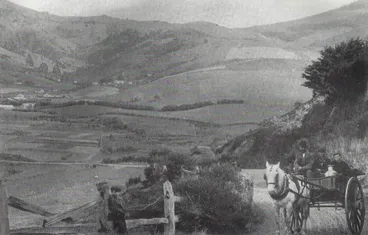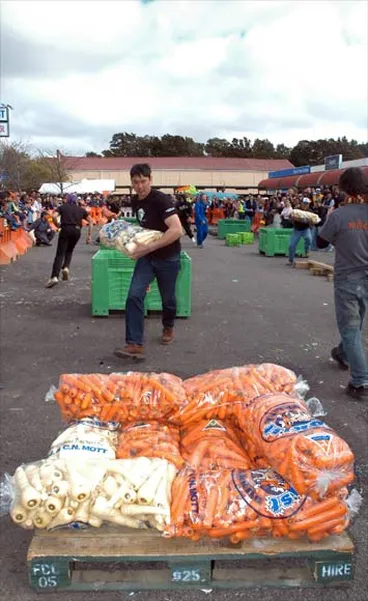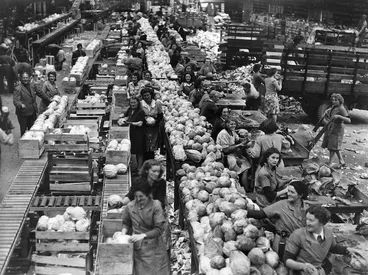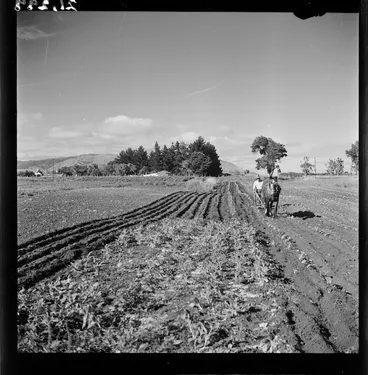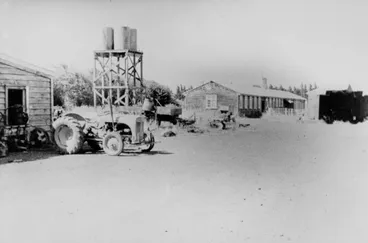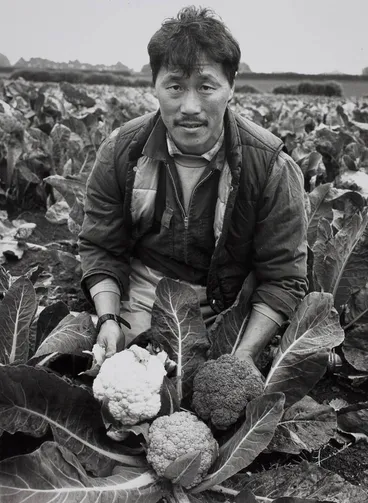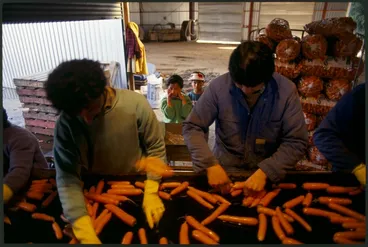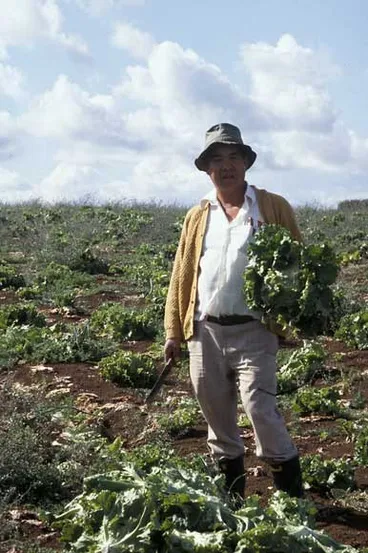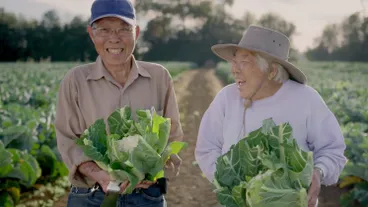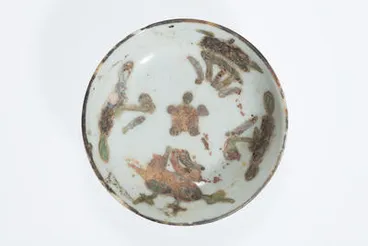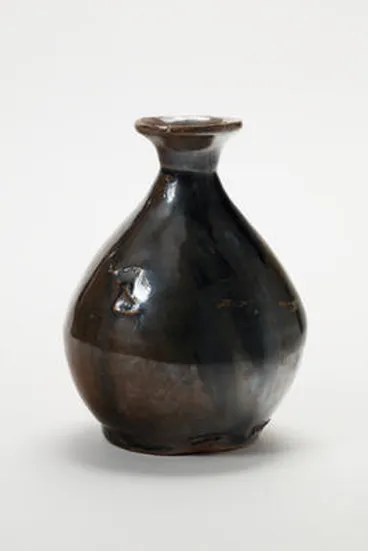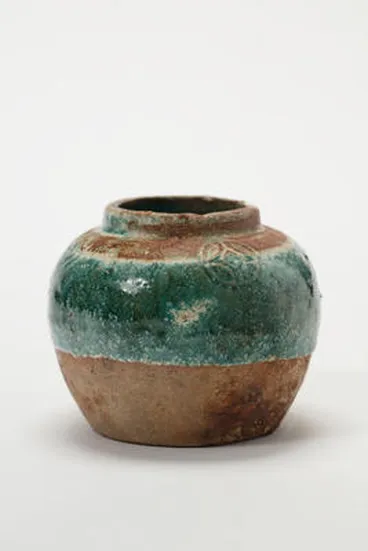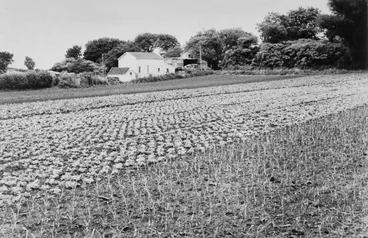Chinese New Zealanders 1880s-1940s: building lives
A DigitalNZ Story by National Library Services to Schools
When gold ran out, a new phase of Chinese community life began. Small Chinese communities sprang up all over New Zealand. Popular businesses were laundries, fruit shops and market gardens.
Pukekohe Chinese Market Gardeners
Archives New Zealand Te Rua Mahara o te Kāwanatanga
BACKGROUND: OCCUPATIONAL CHANGES
As gold ran out many of the Chinese miners returned home to China. Those who stayed on were joined by a new group of Chinese migrants. Undeterred by Aotearoa New Zealand’s new anti-Chinese immigration laws, the new migrants paid their poll tax and set up businesses in cities and rural areas all over Aotearoa New Zealand. Typically these were small family businesses that required modest capital and intensive labour.
CONTENTS
- Life in cities
- Chinese belief systems
- Chinese gardeners
- Market gardens increase
- Chinese market gardener: domestic items
- Papers Past articles relating to Chinese market gardens
- Supporting resources
- Glossary
Chinese settler Wong Tow took his possessions in this and another trunk when he immigrated to New Zealand around 1900.
Trunk
Museum of New Zealand Te Papa Tongarewa
LIFE IN CITIES
From the late 1800s, Chinese urban communities flourished especially in Wellington and Auckland. Numerous community, political and recreational groups sprang up, including the New Zealand Chinese Association. Such associations and community groups were important in the face of anti-Chinese pressures.
Ng Kew (1905-1983) ironing customers’ laundry at Chan Foon and Co, Majoribanks Street, Wellington.
Chan Foon's Laundry, Majoribanks Street, Wellington 1969
Museum of New Zealand Te Papa Tongarewa
Wong Gar Sui and his wife Chung Mew Yuen in their greengrocer’s shop at 305 Ponsonby Road, Auckland, circa 1922.
A Chinese family
Manatū Taonga, the Ministry for Culture and Heritage
In the 1890s, Wellington’s Frederick and Haining St became known as ‘Tong Yun Gai’ (Chinese peoples’ streets).
Chinese enclave, Haining Street
Manatū Taonga, the Ministry for Culture and Heritage
The New Zealand Chinese Association is a national organisation with over 80 years of history.
The New Zealand Chinese Association building
Alexander Turnbull Library
In 1905 retired miner Joe Kum Yung was murdered in Haining St by a white supremacist.
Racist killing in Wellington's Haining St
Manatū Taonga, the Ministry for Culture and Heritage
Built in 1905 this Chinese Mission Hall is associated with the early Chinese settlement in Wellington.
Chinese Mission Hall, 46 Frederick Street
Wellington City Libraries
This Chinese Church in Auckland was originally called Central Hall.
Chinese Mission Hall - Auckland
Presbyterian Church of Aotearoa New Zealand
In the early 20th Century Auckland had its own "Chinatown" located in the city centre around Grey's Ave.
Greys Ave, Auckland, 1960
Museum of New Zealand Te Papa Tongarewa
This calendar shows Chinese festivals and NZ bank holidays, and the number of Chinese in NZ cities and small towns.
[New Zealand Chinese] Association, Wellington :Chinese-English calendar, 1910-1911 [and] 1911-1912.
Alexander Turnbull Library
Group portrait of the Tung Jung Young Men's United Association Football Club, taken in 1927.
Tung Jung Young Men's United Association Football Club - Photograph taken by Crichton d'Ora
Alexander Turnbull Library
Clere, Frederick de Jersey 1856-1952 :Chinese Mission room, Wellington 1905
Alexander Turnbull Library
CHINESE BELIEF SYSTEMS
When the gold miners came to Aotearoa New Zealand they brought their traditional belief systems - Taoism, Buddhism and Confucianism, plus the folk religions that were indigenous to their local areas. The strength of traditional folk beliefs meant that Christian missionaries had a tough time preaching. Presbyterian and Anglican missionaries made few inroads into the community, even with the later growth of Christian missions around the Guangdong region and the community's home villages.
The Christian missions in Aotearoa New Zealand, being funded through donations and church institutions, provided valuable social services and significant educational services to the Chinese.
NZ Anglican Chinese Mission
Archives New Zealand Te Rua Mahara o te Kāwanatanga
These two prosperous market gardeners and orchardists are Joe Quin and Ah Sum of Roxburgh.
Market gardeners, 1888
Manatū Taonga, the Ministry for Culture and Heritage
CHINESE GARDENERS
Market gardening has been a longstanding profession for Chinese New Zealanders. Early migrants had farming backgrounds, and there are records of Chinese market gardens as early as 1866. From the 1880s Chinese began settling throughout the country, often leasing land from Māori for horticulture.
Tse Tsun (on right), outside his dwelling, built of wood and iron, at Gabriel's Gully near Lawrence, 1903.
Tse Tsun's House, Gabriels Gully
Presbyterian Church of Aotearoa New Zealand
Chinese market gardeners, early 1900s
Manatū Taonga, the Ministry for Culture and Heritage
Market garden, Māngere, 1956
Auckland Libraries
Cabbage grower, Pukekohe, 1993.
Auckland Libraries
MARKET GARDENS INCREASE
By 1899 about 1,390 hectares were in market gardens. As roads and railways appeared, market gardens began to develop in districts like Pukekohe and Levin, some distance from the cities that were their main markets.
During the Second World War vegetable production became an essential activity. The government compulsorily leased land for growing vegetables and directed people to work in the gardens. Chinese market gardeners were eager supporters of the war effort. In 1943 the Labour Government asked Chinese growers (who were given ‘Essential Workers’ status) to help supply all the Allied forces in the Pacific with vegetables. Chinese market gardeners exempted from military services proudly regarded this as their significant contribution to Aotearoa New Zealand’s war efforts.
As well, (in 1943) the Dominion Federation of Chinese Commercial Growers was formed at the request of the then Labour Government. By 1945, 6,800 hectares were in vegetable cultivation and a surplus of vegetables was being produced.
Source: Market gardens and production nurseries — History of market gardening, Te Ara - the Encyclopedia of New Zealand. CC BY-NC 3.0 NZ. Information added.
These market gardens are in Sawyers Bay, north of Dunedin.
Early Chinese Market Gardens
Tauranga City Libraries
Carrot and parsnip stacking and wrapping challenge
The annual Ohakune Carrot Carnival, celebrates the contribution that market gardeners make to the local economy.
Manatū Taonga, the Ministry for Culture and Heritage
In WW2 Chinese market gardeners supplied vegetables (used in soldiers’ rations) to dehydration plants like this one.
Interior of a food dehydration plant in Pukekohe during World War II
Alexander Turnbull Library
During World War II Chinese market gardeners had contracts to supply US troops in the Pacific.
Market garden at Otaki used for supplying United States troops
Alexander Turnbull Library
Market garden, Māngere, 1956
Auckland Libraries
Market gardener, Mauku, 1991
Auckland Libraries
Market gardener washing carrots for market, Pukekohe, 1990s.
Carrots being processed for market, Pukekohe
Alexander Turnbull Library
Chinese gardener, Pukekohe
Manatū Taonga, the Ministry for Culture and Heritage
Chinese market garden mural
Kete Horowhenua
dish, condiment
Auckland War Memorial Museum Tāmaki Paenga Hira
CHINESE MARKET GARDENER: DOMESTIC ITEMS
The following domestic items of Chinese origin were discovered as part of an archaeological dig. These items are probably associated with the Ah Chee family who were market gardeners at Carlaw Park for 50 years from the 1870s.
pitch fork
Auckland War Memorial Museum Tāmaki Paenga Hira
bottle
Auckland War Memorial Museum Tāmaki Paenga Hira
jar, ginger
Auckland War Memorial Museum Tāmaki Paenga Hira
PAPERS PAST ARTICLES RELATING TO CHINESE MARKET GARDENERS
CHINESE MARKET (Evening Post, 17 October 1930)
National Library of New Zealand
THE CHINESE IN NEW ZEALAND. (Wanganui Chronicle, 26 January 1897)
National Library of New Zealand
THE VEGETABLE TRADE. (Wanganui Chronicle, 21 May 1913)
National Library of New Zealand
SUPPORTING RESOURCES
Occupational changes
A metric tonne of Chinese-New Zealand history — kiwifruit wasn’t the only Chinese newcomer taking root in New Zealand soil during the 20th Century. Chinese families were also adapting to the conditions and finding ways to flourish—many of them as market gardeners and produce sellers.
Auckland: Chinese footprints — by the turn of the 20th Century Auckland had its own "Chinatown".
Chew Chong, Taranaki entrepreneur— one of New Zealand's first dairy factories was opened near Eltham in 1887 by Chinese entrepreneur Chew Chong.
Chinese portraits — these images of Chinese immigrants who wanted to leave New Zealand temporarily were taken between 1904 and 1956.
Chinese Mission Hall — Chinese Mission Hall is one of the few remaining buildings associated with the early Chinese settlement in Wellington which was concentrated in the Frederick Street and Haining Street area.
Early Chinese restaurants in Auckland — in the 19th century there were several Chinese restaurants in Auckland. Neither were they decorated with red lanterns and arches nor did they serve chop suey and chow mein.
Jack Lum's 50 fruitful years — from humble beginnings, grower-turned-greengrocer Jack Lum has spent half a century cultivating a thriving business.
Minnie Alloo of Dunedin and the Women’s Suffrage Petition — Minnie Rose Alloo was born in Queenstown, New Zealand, in 1874.
Showcasing Chinese resources — in 2020 the Alexander Turnbull Library highlighted a collection of treasures held in the Library from the Doris Chung Chee Kung Tong (‘Society for promoting public good’) Chinese Masonic Society.
The forgotten world of Chinese-owned fruit shop — in the '50s, '60s and '70s, almost every small town and city suburb had a fruit shop run by a local Chinese family.
The story of one of the first Chinese women in Auckland — Joong Chew Lee arrived in New Zealand from China in 1886 at a time when there were few Chinese women in Auckland.
Chinese market gardeners
Asian Report, market gardeners 2013 — Lynda dons a pair of gumboots to learn about growing the best vegetables around with three generations of a Chinese market gardening family in Levin.
Chinese market garden settlement — the Ng King Brothers Chinese Market Garden Settlement in Ashburton, is a rare remaining example of a twentieth century Chinese market garden settlement in New Zealand.
Chinese market gardening in New Zealand — a presentation on the history of Chinese market gardening in Aotearoa New Zealand by academic James Beattie. It was delivered to the Australian Gardening History Society in 2019, (pdf, 4.67 MB).
The Chinese way — in the home of a Chinese market gardener, owners of Tāmaki market gardens with their employees (including many Māori) welcomed in the Chinese New Year at midnight.
The days when produce was grown on Dunedin's doorstep — the Otago Daily Times' Bruce Munro looks back on a time when 24 Chinese market gardens flourished on the fertile Taieri plains.
From gold mines to green fields — looks at the contribution of Chinese market gardeners in Aotearoa New Zealand.
The Ah Chee market gardens and Pukekawa/Auckland Domain — the Chan Ah Chee family had a market garden adjoining the Auckland Domain for almost forty years from 1882.
Making a life — Chinese market gardens and fruit shops were once scattered throughout the country and helped feed Kiwis for decades.
GLOSSARY
Definitions below have been taken from the Oxford Learner’s Dictionary and Te Aka, the Māori dictionary.
Anglican — a member of the Church of England or of a Church connected with it in another country.
association — an official group of people who have joined together for a particular purpose.
Buddhism — an Indian religion widely followed in Asia, based on the teaching of Siddhartha Gautama (or Buddha).
capital — wealth or property that is owned by a business or a person and can be invested or used to start a business.
Confucianism — a religion based on the teachings of the Chinese philosopher Confucius.
cultivation — the preparation and use of land for growing plants or crops.
exempted — to give somebody official permission not to do something or not to pay something they would normally have to do or pay.
federation — a group of clubs, trade unions, etc. that have joined together to form an organization.
horticulture — the study or practice of growing flowers, fruit and vegetables.
immigration — the process of coming to live permanently in a different country from the one you were born in.
market gardening — a type of farm where vegetables and fruit are grown for sale.
missionaries — people sent to a foreign country to teach people about religion, especially Christianity.
mutual — used to describe feelings that two or more people have for each other equally or actions that affect two or more people equally.
Presbyterian — connected with the Presbyterian Church, a branch of the Christian Protestant Church that is the National Church of Scotland and one of the largest Churches in the US.
Taoism — a Chinese philosophy based on the writings of Lao-tzu.
undeterred — if somebody is undeterred by something, they do not allow it to stop them from doing something.
This story was curated and compiled by Te Puna Mātauranga o Aotearoa | National Library of New Zealand, Services to Schools staff, 2023. We acknowledge the content, research, guidance, and review provided by Kirsten Wong for the New Zealand Chinese Association, Lynette Shum, and Emeritus Professor Dr Manying Ip.
Market garden, Māngere, 1956
Auckland Libraries
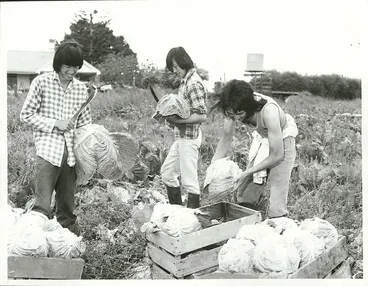

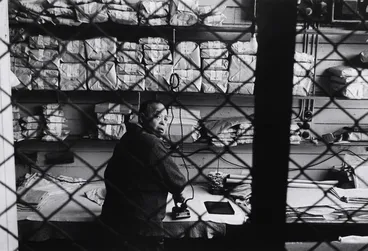
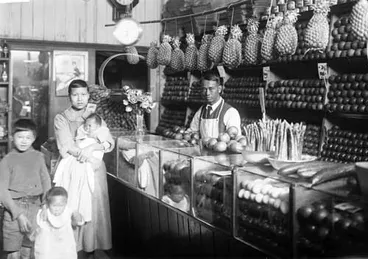
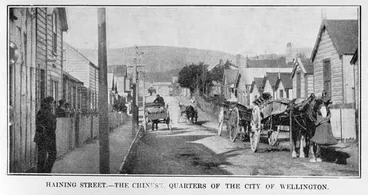
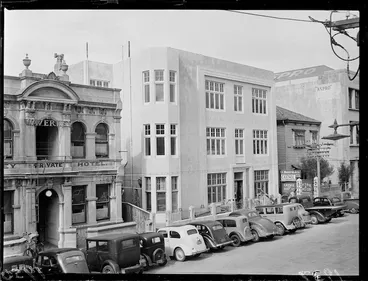
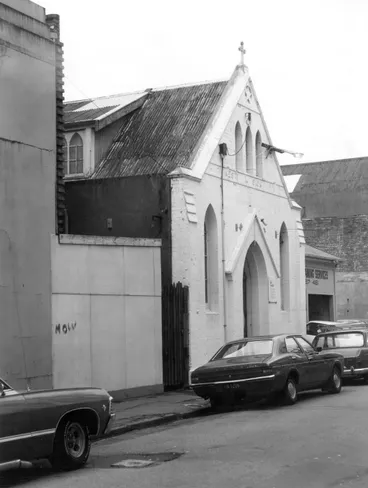
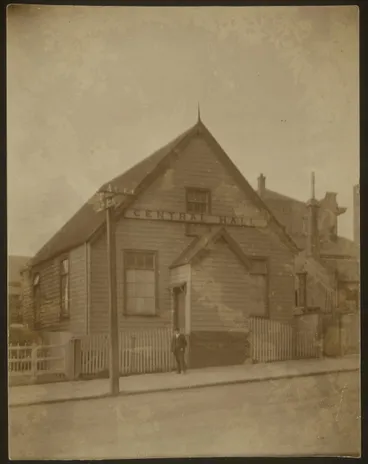
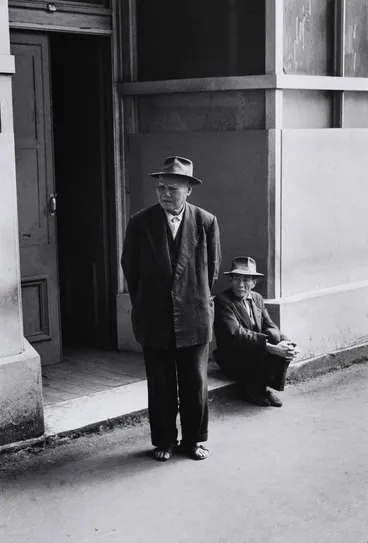
![[New Zealand Chinese] Association, Wellington :Chinese-English calendar, 1910-1911 [and] 1911-1912. Image: [New Zealand Chinese] Association, Wellington :Chinese-English calendar, 1910-1911 [and] 1911-1912.](https://images.digitalnz.org/_ZDvg5sEAEjyt3X35OGJWzq-mz4=/368x0/https%3A%2F%2Flive.staticflickr.com%2F5783%2F21014706744_4e12795e19_z.jpg)
